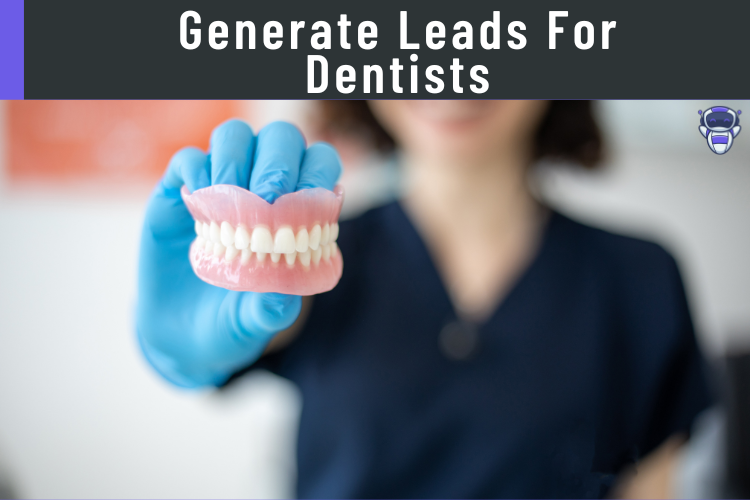Dentists generate leads to attract more potential patients through marketing and advertising strategies. They gather the leads by acquiring the patient’s name, email, or phone number, which they can use to turn a prospect into a patient and nurture them later. Now we’ll discuss how to generate leads for dentists.

Contents
- 1 How To Generate Leads For Dentists?
How To Generate Leads For Dentists?
Being a dentist you need patients who will visit you and that’s how you can earn. For that, you need to apply marketing strategies that will bring you new and potential patients, and here’s how you can do it to generate leads for dentists;
- SEO (search engine optimization)
- Pay-Per-Click (PPC) Advertising
- Referral Program
- Online Reputation Management
- Conversion rate optimization (CRO)
- Social media
- Content marketing
- Email marketing
- Lead management
SEO (search-engine-optimization):
When we are looking or searching for something, the first thought that comes to our mind is to look it up online. We go to Google and search for it. We usually click on the options that come up on the top.
This is where SEO steps in. You should optimize your business on search engines to get the utmost results. So when someone is searching for a dentist, they get linked to you through SEO.
However, if you want to be at the top of the first page for search results on Google, you need to have a website that’s useful to visitors and performs well.
Improving your SEO will include:
- Conducting a keyword audit of the terms relevant to your audience that you should be ranking for. For example; keywords include dentist near me, dentist [city], cavity appointment, teeth cleaning appointment [city], and more
- Incorporating your top keywords throughout your website and in content, such as a blog
- Make sure your website and content on your blog are helpful to the audience. For example, if someone is searching for dental implants, the page they land on should discuss what dental implants are and what the procedure is like and confirm that you offer them
- Ensuring your website load speed is as fast as possible. Approximately 40% of visitors will leave a site if it takes more than three seconds to load. You can improve site speed by compressing files, reducing the number of plug-ins, and optimizing your image sizes
- Ensuring your website is mobile-friendly, as approximately 63% of all searches are now done on a mobile device
- Incorporate link building by linking to other authoritative sites and finding ways for authoritative sites to link back to you. This helps verify to Google that your site is credible
Pay-Per-Click (PPC) Advertising:
PPC for dentists or dental Pay Per Click advertising is a form of online dental marketing that consists of listings that typically show up at the top of search engine results and which only cost a dentist if someone clicks on them.
Depending on your local market, this approach can be fairly expensive per lead. There are only three spots per keyword, so you’ll have to outbid your competitors. Still, you can optimize your campaign and set budget limits so you don’t spend more than you can afford.
Pay-per-click (PPC) advertising can quickly attract more potential dental patients to your website. Tools that you can use to do this type of ad are “Google Ads” and “Bing Ads.”
Referral Program:
A “referral program” is when your existing customers refer you to their acquaintances. It is very essential to maintain a healthy relationship with your existing clientele. If you’re confident that you deliver exceptional service and have a happy customer base, you can leverage them for referrals to their friends and family.
Your referral program will have to offer an incentive to the patient. Some potential ideas include 10% off their next bill or a free oral cleaning for both them and their referral.
Make sure to announce your referral program with an email to all your patients, have signs at the front desk about the program, and make sure your front desk receptionist mentions it, too.
Online Reputation Management:
Moreover, ensure that your online presence is noticeable as when people search for dentists, they look up online and they hunt for good reviews. Your dental practice should collect reviews from customers as much as possible. Approximately 84% of people trust online reviews as much as a friend.
Online reputation management is the management of all online reviews for your business. This can include reviews on your Google Business Profile listing, social media platforms, and Yahoo or other review platforms.
Some important tips for gathering and managing reviews are:
- Send customers an email thanking them for coming to their appointment with a request to review the clinic.
- Have a “Please review us” sign at the reception desk.
- Set up a Google Business Profile account and actively manage it so it’s always up to date with the correct phone number, address, and hours (including updated holiday hours).
- Claim or set up accounts on all review platforms, such as Yahoo.
- Respond to every single review — good or bad — on all platforms within one day of receiving them.
Conversion rate optimization (CRO):
If you want your site users/visitors to turn into patients then you need to convert them into leads and the best way to do that is by asking for their email addresses, either in contact forms or email newsletter signups.
After that, you can use the CRO, to improve your site and get the most possible conversions.
Furthermore, CRO involves testing multiple versions of different elements on your site (like buttons, forms, and calls to action) to judge which is the most effective method in converting your visitors. Then, you can implement the best version, and move on to testing another element.
Social media:
Furthermore, social media involves Facebook, Twitter, Instagram, etc. It is very crucial to maintain your social media handles actively and with a good rep. They can come in very handy in attracting patients to your dentistry.
You can post your whereabouts, your offers & deals, and your contents on it. You can also answer your follower’s/patient question and you can also ask them questions/reviews and resolve issues through your social media profile. If needed, they can contact you in your profile too.
Being a dentist, you can also host contests or giveaways for your patients on your social media account. This can involve many of your existing and new patients generating more leads to your database. You can give a gift, voucher, or a prize to the winner to keep them engaged.
Content marketing:
Content marketing is a very important part of generating leads. It brings traffic to your website. Always try to post interesting content regularly so that people get curious and visit your site.
What type of content should you post?
Content is all about creativity. You can publish blogs on topics that a patient can have for his/her dentist. Suppose, there can be questions from your patients “How often should they floss?” — “Is a bi-annual checkup really necessary?” — And while the answers may seem simple to you, providing them on your site is extremely helpful to people who want to learn more about dental health.
You can provide this kind of information in the form of blog posts, infographics, or even videos on your site. Then, when people come across those pages, you have a chance to not only get your brand in front of them but also make a great first impression as a helpful, trustworthy source of information.
Email marketing:
After you’ve gathered the email addresses provided to you via landing pages/forms, now it’s time to reach out to them.
Start by sending them your daily newsletter. Inform them about your ongoing offers/deals. Promote your service through emails, this way a prospect gets curious to use your service.
Once a prospect responds to you, catch them and keep nurturing them until they turn into a customer.
Lead management:
The final step is to manage the leads that were generated. You’ve to nurture them and keep them in your book. You’ve to keep track of each of your dental leads. You have to keep a note of your prospect’s name, phone number, and email address so you can respond with answers to their questions and help them set up an appointment.
You’ll also have to see how each of your leads found your practice, whether it’s through a search engine, social media ad, pay-per-click campaign, or any other marketing channel you use for your dental lead generation strategy.
Then, you can use this information to understand where your best leads are coming from and improve your strategy moving forward. You can hire someone for this task or you can get yourself a software tool to manage your leads.
To Wrap It Up:
We’ve discussed how to generate leads for dentists and the significance of lead generation in the dental industry. If you’re a dentist then this article is perfect for you. This article has all the information needed for a dentist regarding lead gen.
We hope we were able to help you with this piece of article and we wish you all the best! Since you read how to generate leads for dentists then why don’t you also read “What is Lead Generation For Lawyers?“
Thank you for reading and being with us!


